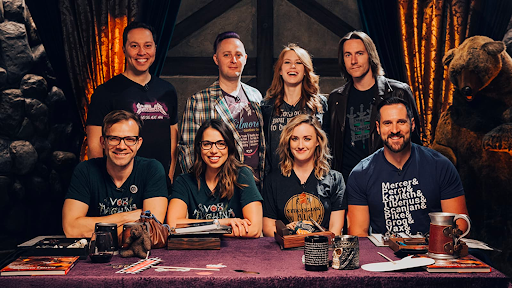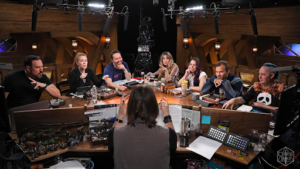The Phenomenon Of Critical Role

Hannah Hughes ‘25 / Emertainment Monthly Staff Writer
For almost fifty years, Dungeons and Dragons has been exciting and challenging players with
endless possibilities and the ability to shape the game into whatever you want it to be. Arguably the most well-known TTRPG (table-top roleplaying game), it’s no surprise that the game has remained a cult classic with a dedicated fanbase.
But D&D is meant to be experienced. In order to really enjoy D&D, you’ve got to be in it, role-playing your character, rolling the dice… Just merely watching a game of D&D sounds boring, right?
Well, a group of “nerdy-ass voice actors” would beg to disagree.
Critical Role is a weekly livestream where eight friends sit around a table to play Dungeons and Dragons. The group began livestreaming back in 2015 via a Youtube Channel called Geek & Sundry, and have since launched their own company, done several live shows and appearances, make music, and even have their own television series.
In eight years, the show has amassed a number of fans comparable to that of D&D itself, and has even had elements from their own game adapted into official D&D canon.
But what makes Critical Role so special?
Firstly, the cast is made up of exceptionally talented voice actors: Laura Bailey (The Last Of Us: Part II and Spider-Man video games), her husband Travis Willingham (Avengers Assemble), Sam Riegel (2003’s Teenage Mutant Ninja Turtles TV show and DuckTales), Liam O’Brien (Asura’s Wrath, Final Fantasy VII), Ashley Johnson (The Last Of Us video game, Blindspot), Taliesin Jaffe (Hellsing, Street Fighter IV), and Marisha Ray (8.13, Batgirl: Spoiled).
The cast’s experience with character development and acting allows them to create and embody their respective roles, much like they would for any of their other work. The moments they create in-character with each other range from tense to hilarious, but all are meaningful and enjoyable for the audience.
No D&D party would be complete without a well-rounded, organized, and talented Dungeon Master at the helm. Critical Role has none other than Matthew Mercer (Fallout 4, Resident Evil: Damnation). Mercer leads his games with an elegance and intensity that draws you in. He has a talent for describing things in such a detailed manner that really helps you envision this expansive world he’s created, while giving each of his players’ room to explore not only Exandria, but themselves as well. He is able to let the cast have fun, while also reigning them in and guiding them along when needed.
However, the key to Mercer’s success is putting his friends before the camera. He has said before that running games is about making gifts for his players, and that the audience is not his concern. However, this approach is what really keeps the cast invested in the game, which then results in good content for the audience.

Because of Mercer’s great world-building, and the cast’s excellent roleplaying, Critical Role plays D&D as a caliber that is so special to watch, as it is a level that very few players ever get to experience in their home games. The world of Critical Role has become so complex, that it feels “like a four-hour long improvised episode of television,” as explained on their website.
But most importantly, it’s the casts’ genuine dynamic. The game of Dungeons & Dragons is such a vulnerable experience, and if you’re playing right, it’s an extremely involved experience with highs and lows. A lot of playing successfully comes from care and comfortability, which is not something that can be faked or easily performed.
Despite their background as talented actors, Critical Role doesn’t need to pretend. They’ve talked time and time again about how their friendship is the same on and off the screen, and we believe them.
They boost each other up, tease each other, work together, and even get frustrated with each other from time to time. Watching the cast of Critical Role is like sitting around the table with your own friends, cracking a few jokes, and going on the journey that is a session of Dungeons and Dragons.
At its core, that is what makes the show so appealing, and that is what keeps audiences coming back. The group dynamic is just something that is impossible to replicate or deny.